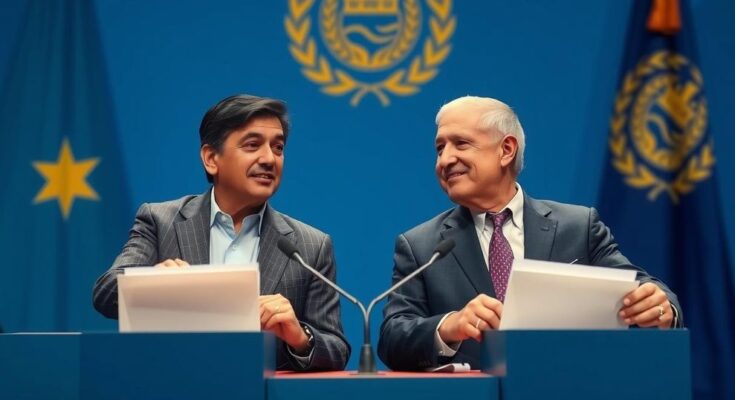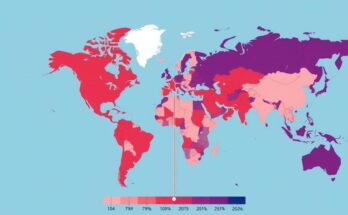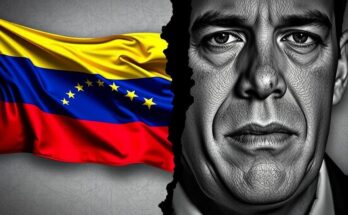Uruguay conducted presidential elections featuring two moderate candidates, reflecting its tradition of political stability. Voter turnout exceeded 88%, and the contest was marked by a general consensus on policies, particularly concerning a contentious social security reform. The electorate showed satisfaction with current government policies despite underlying social issues such as crime and child poverty. Both candidates demonstrated civility in their campaigns, contrasting with the divisiveness seen in other regions.
On Sunday, Uruguay held presidential elections characterized by a contest between two moderate candidates, maintaining its reputation for political stability amidst regional turbulence. Voter turnout was notably high, exceeding 88%, as citizens participated in choosing their new president and casting votes on a significant social security referendum. The electoral race involved the incumbent conservative coalition led by Louis Lacalle Pou, who enjoys a favorable approval rating, and challenger, center-left candidate Yamandú Orsi from the Frente Amplio coalition. In this context, the focus was not only on the presidential candidates but also on the contentious pension reform proposal that aims to alter the social security framework, a concern that has garnered more media attention than traditional campaign issues like education and child poverty. Both candidates exhibited a general consensus on major topics, which has led to expectations of stability rather than major shifts post-election. The campaigns notably lacked the hostility prevalent in other Latin American elections, with both candidates exhibiting respect and civility. Álvaro Delgado, representing the ruling party, emphasized the spirit of democracy, while Orsi expressed pride in Uruguay’s long-standing democratic practices. Despite Orsi leading in the polls, the potential for a runoff looms if he fails to secure a majority. Candidates are addressing key issues such as rising crime rates and child poverty; however, the electorate’s engagement appears muted. The public sentiment demonstrates satisfaction towards the government policies, contrasting sharply with the volatility seen in neighboring nations. The election also appears to reflect broader trends, indicating that the Uruguayan populace remains focused on stability and moderate governance.
Uruguay is often lauded as a model of democracy in Latin America, characterized by political stability and a strong adherence to democratic processes. In recent years, it has successfully navigated various political shifts, avoiding the severe polarization and democratic backsliding observed in several neighboring nations such as Brazil and Argentina. The current election reflects a continuation of this pattern, with both candidates positioned as moderates who largely agree on policy issues, reinforcing the importance of stability over drastic changes in governance. The current socioeconomic landscape, marked by concerns over child poverty and crime rates, further underscores the electorate’s preference for steady leadership against a backdrop of innovative social policies historically crafted by previous administrations.
The recent elections in Uruguay underscore the nation’s commitment to political stability, with an impressive voter turnout indicating public interest despite the muted engagement with the campaigns. Candidates representing moderate viewpoints have resonated with a populace generally satisfied with the status quo, differentiating Uruguay’s political climate from that of its neighbors. While the electoral outcomes may not provoke radical shifts, the overall emphasis remains on maintaining a democratic process that prioritizes continuity and gradual reform. This election ultimately serves as an affirmation of Uruguay’s entrenched democratic principles and the value its electorate places on stable governance.
Original Source: www.pbs.org




